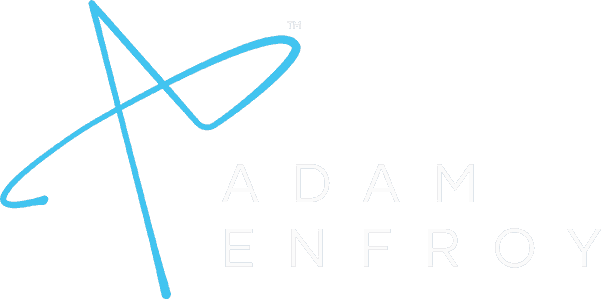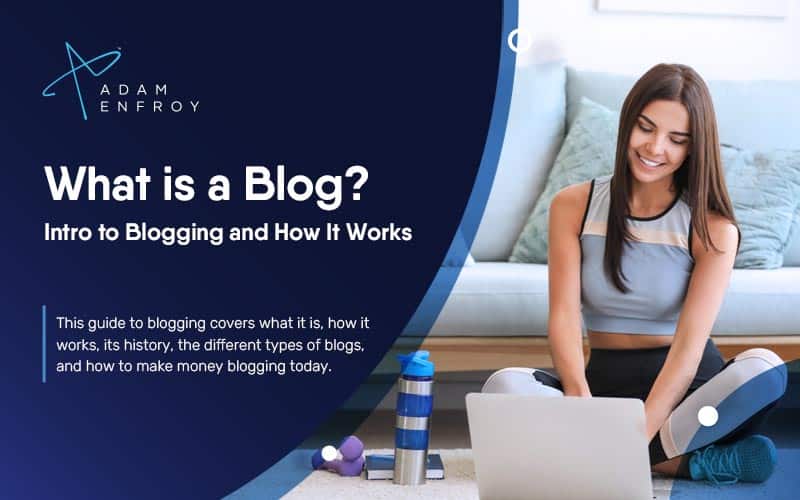7 Best AI CRM Tools of 2024 (Ranked and Reviewed)

Most business owners don’t have a proper CRM in place.
As a result:
- They don’t answer business inquiries quickly.
- They don’t follow up with leads.
- They don’t have the right conversations at the right time.
- They flush hundreds of thousands of dollars down the drain.
…But not you!
You’re not only aware of what the right CRM can do for your business.
You also use tools that combine AI and CRMs, giving you the ultimate business powers.
(Or if you don’t use these tools yet, my hope is that you will start after reading this article)
In this article, I will share the best AI CRM tools for your business.
Most of these tools are easy to set up and will provide an immense return on any investment you make.
What Are the Best AI CRM Solutions?
Here are the best AI CRM solutions.
1. Pipedrive.
Best for small to medium-sized businesses.
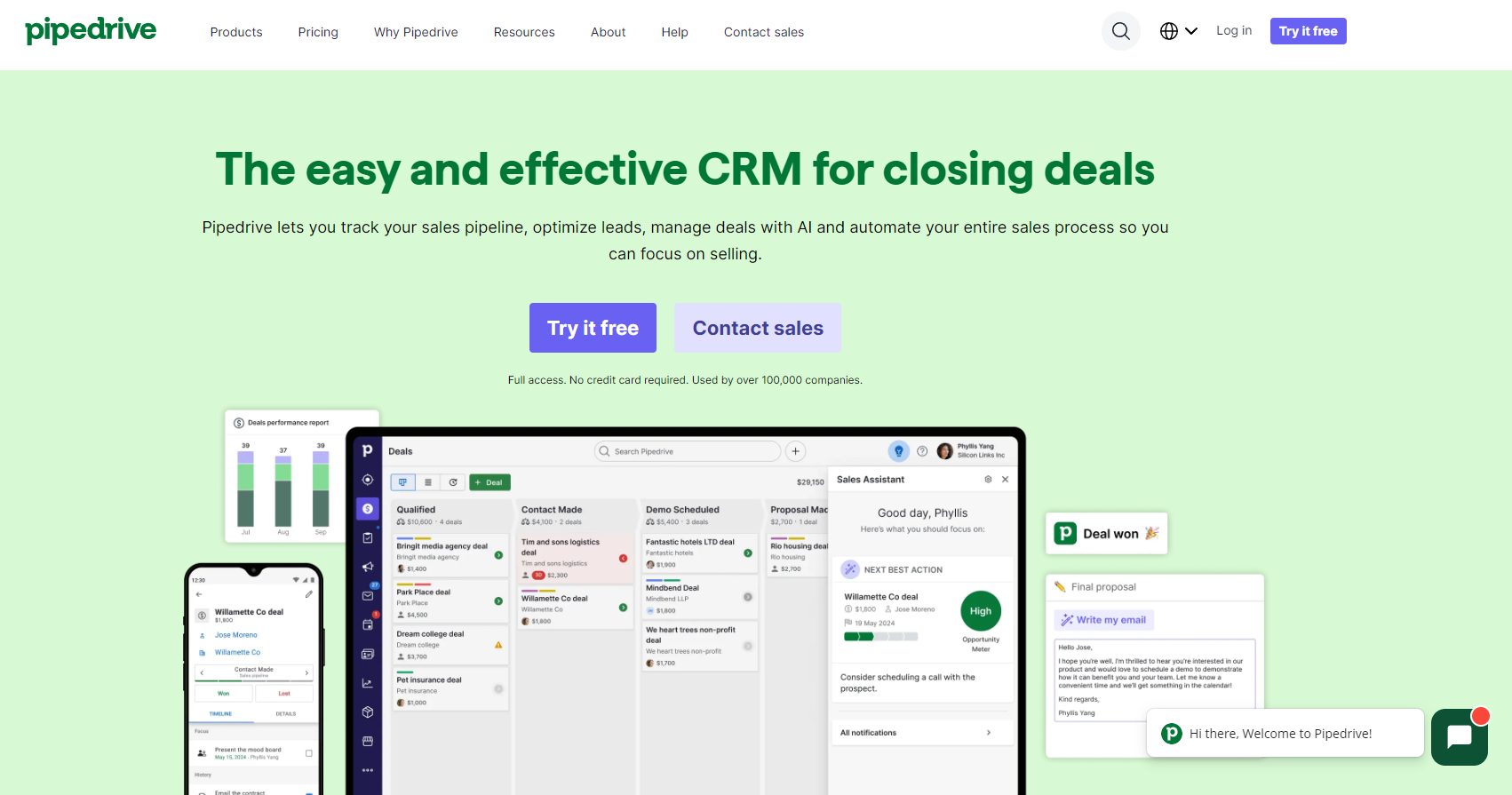
Think CRMs are just about storing contact info?
Pipedrive users might disagree.
This CRM takes your sales game to a whole new level with its AI-powered features.
Trusted by over 100,000 companies across 179 countries, Pipedrive is designed to make closing deals a breeze.
This system is all about supercharging your entire sales process with the power of AI.
Key Features:
- Automated Lead Nurturing: Say goodbye to hours of manual follow-ups. Pipedrive’s AI-powered prompts help prioritize your leads.
- Sales Insights and Reporting: Get real-time sales reports with AI suggestions to optimize your strategy.
- AI-Powered Sales Automation: Streamline your communication and eliminate tedious manual processes.
- Customization and Adaptability: Tailor Pipedrive to fit every step of your buyer’s journey.
- Integration Capabilities: Connect Pipedrive with hundreds of other apps through its Marketplace.
Pros:
- User-friendly interface with consistently high ratings across various platforms
- Scalable plans to accommodate business growth, from basic organization to advanced customization
- Significant improvements in sales processes and productivity reported by users
Cons:
- Some advanced features may require higher-tier plans
- The learning curve for utilizing all AI-powered features effectively is quite steep
- May be overkill for very small businesses or solopreneurs
2. HubSpot
Best for getting started with powerful free features
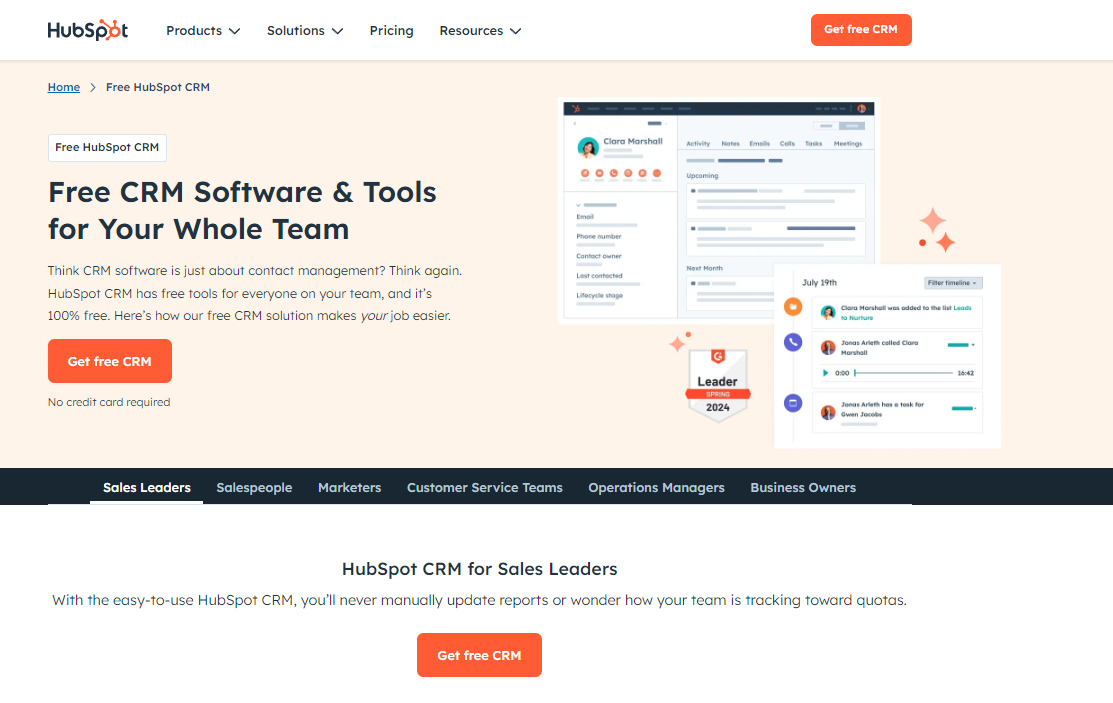
Many go for a HubSpot CRM because it’s free to get started.
HubSpot also stands tall when it comes to its brand name.
This powerful platform goes beyond simple contact management.
It offers tools for sales, marketing, customer service, and operations teams.
From lead scoring to predictive analytics, HubSpot leverages artificial intelligence to enhance decision-making and improve customer interactions.
The best part?
You can access many features without entering your credit card details.
Key Features:
- AI-powered lead scoring and analysis: This feature forces you to focus on the leads with the highest potential.
- Customizable AI chatbots: Engage with customers 24/7 through intelligent chatbots that can handle inquiries, qualify leads, and provide support.
- Unlimited data management: Store up to 1,000,000 contacts without worrying about data expiration, allowing you to grow your customer base without constraints.
- Visual sales pipeline management: Gain real-time insights into your sales activities with intuitive dashboards, helping you make data-driven decisions to close deals faster.
- AI-assisted marketing personalization: Tailor your marketing campaigns with AI-driven insights.
Pros:
- 100% free for basic features. This makes HubSpot a good choice for small businesses and startups.
- User-friendly interface makes for quick adoption across different teams
- Combines marketing, customer service and sales within one interface.
Cons:
- Eventually, you’ll have to upgrade to a paid plan as your database grows bigger.
- The free version doesn’t give you as many features as the paid ones. You might have to upgrade sooner rather than later based on your specific requirements.
3. ClickUp
Best for Centralized Work Management
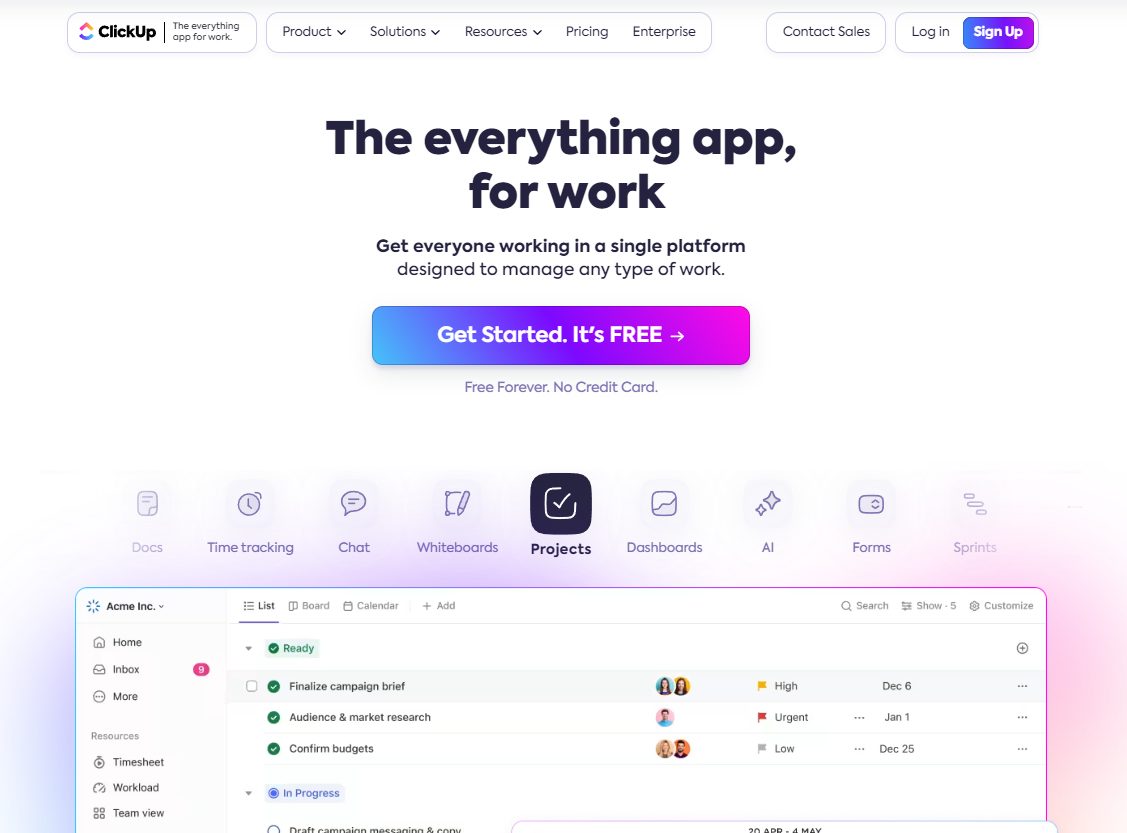
ClickUp is a comprehensive AI-powered CRM solution.
It combines productivity, collaboration, and customer relationship management – in one centralized platform.
With its innovative AI assistant tailored to your specific role, ClickUp empowers teams to work smarter and faster.
Whether it’s streamlined workflows, enhanced decision-making, or improved customer interactions, Clickup can help.
Overall Clickup offers flexibility and extensive integration capabilities.
Key Features:
- AI-powered assistant: This feature supercharges productivity by automating routine CRM tasks.
- Flexible workflows: With 15+ customizable views including list, board, and Gantt, ClickUp adapts to your team’s preferred working style.
- Centralized work management: By bringing all teams and tasks into one platform, ClickUp eliminates silos and enhances visibility.
- AI-driven insights: ClickUp’s AI analyzes customer data to provide valuable predictions and recommendations.
- Extensive integrations: ClickUp seamlessly connects with your existing tools, reducing software sprawl and creating a more cohesive tech ecosystem for your CRM needs.
Pros:
- Highly customizable to fit various work types and team preferences
- All-in-one solution that can replace multiple apps, reducing software costs
Cons:
- Some users might find the interface overwhelming initially
- Certain advanced AI features may require additional investment or higher-tier plans
4. Zoho CRM
Best for comprehensive AI-driven customer relationship management
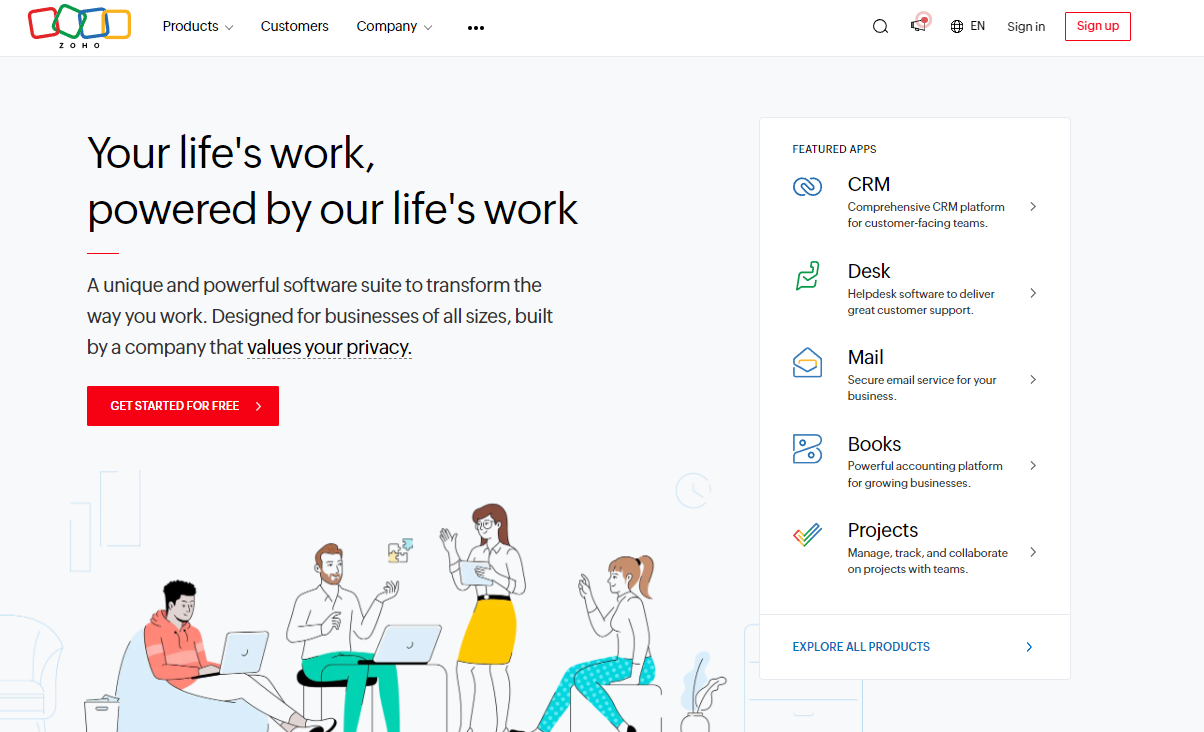
Zoho CRM stands out in customer relationship management.
This CRM solution integrates with various business management applications as part of the broader Zoho Cloud Software Suite.
It also provides a unified approach to streamlining operations across departments.
At the heart of Zoho CRM lies its AI-powered assistant, Zia.
Zia elevates the platform from a mere data repository to an intelligent, proactive tool for sales and customer engagement.
Zia’s capabilities extend beyond basic automation.
These capabilities go into predictive analytics and personalized recommendations.
Key Features:
- AI-Powered Assistant Zia: This feature assists in data collection, document writing, and sales analysis.
- Predictive Sales Analytics: Sales teams can prioritize deals likely to close, enabling a more strategic approach to customer engagement and resource allocation.
- Integrations With Other Zoho-Based Tools: Zoho CRM effortlessly integrates with other Zoho applications (such as Zoho Desk, Mail, Books, and People), offering a comprehensive business management ecosystem.
Pros:
- Comprehensive AI-driven insights for enhanced decision-making
- Strong focus on data privacy and security, with no reliance on advertising revenue
- Continuous feature updates based on customer feedback, ensuring relevance and utility
Cons:
- Pricing for full feature access may be higher compared to simpler CRM solutions
- There is a learning curve if you’re not already using the tools within the Zoho ecosystem.
5. C3.ai
Best for Enterprise-Level AI-Powered Sales Optimization
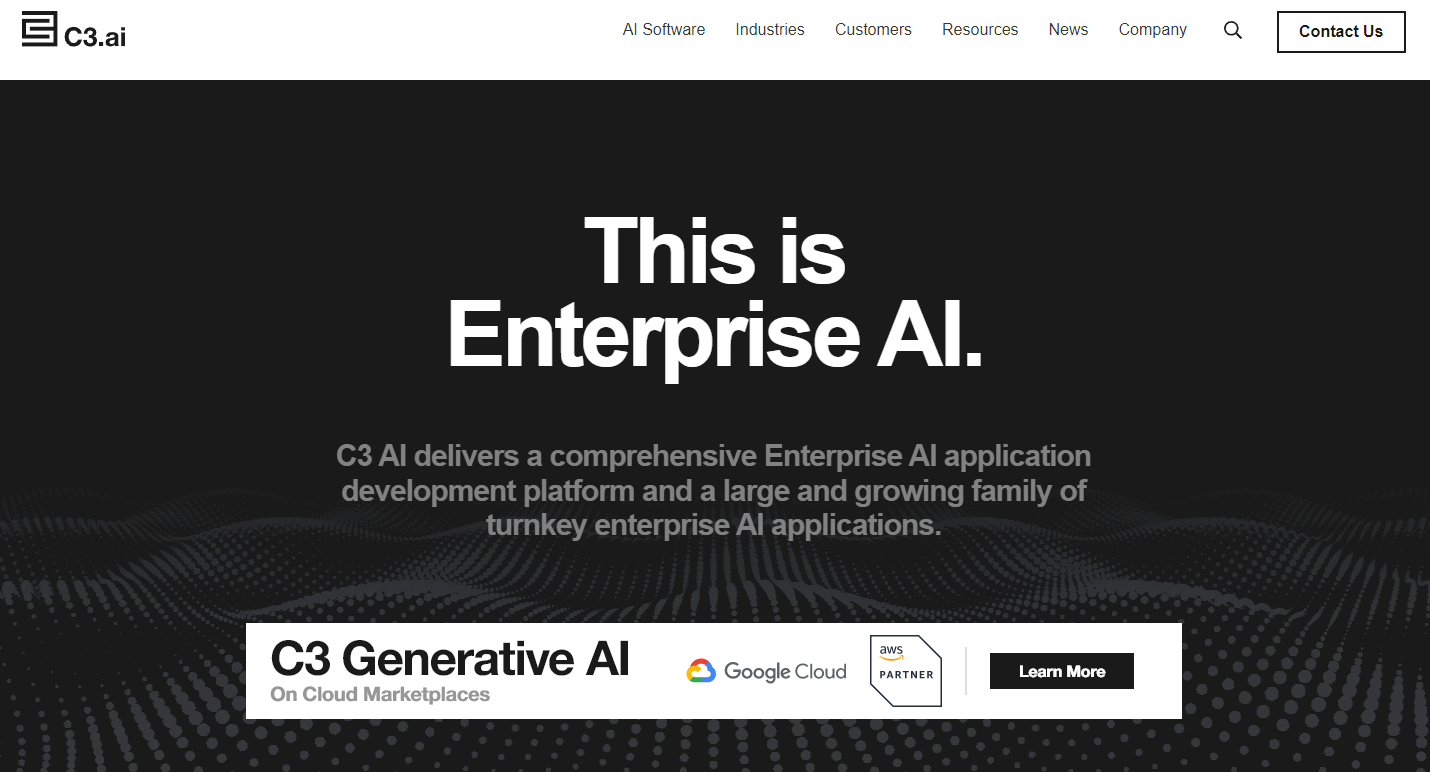
C3 AI CRM has one mission – to revolutionize customer relationship management for large enterprises.
This powerful tool combines advanced AI capabilities with comprehensive CRM functionality.
By integrating external data sources and utilizing sophisticated AI algorithms, C3 AI CRM provides sales teams with:
- Accurate forecasts
- Deep pipeline analytics and
- Valuable relationship insights.
The platform can handle complex enterprise environments.
The complexity makes C3 AI an ideal choice for organizations looking to enhance their productivity and revenue generation.
Key Features:
- AI-Powered Forecasting: Delivers 97% forecast accuracy across multiple business dimensions. This means you can confidently predict revenue, bookings, and consumption.
- External Data Integration: Enrich your CRM data with the right sources, including firmographic, financial, industry, and macroeconomic data.
- Advanced Pipeline Analytics: Provides rich visualizations and in-depth pipeline generation and opportunity progression analysis. You can easily identify hot spots and optimize your sales funnel.
- Relationship Intelligence: Sales Vision offers relationship visualizations, allowing you to improve sales execution by identifying single-threaded deals. This is the feature you want when you’re after stakeholder engagement and monitoring overall relationship health.
- Enterprise-Wide Integration: Manage deals, monitor pipelines, and make forecasts across all business units – all from one centralized platform. You can use over 200 pre-built connectors.
Pros:
- C3 AI boasts rapid deployment options, delivering results in weeks rather than years.
- The platform offers a comprehensive AI-powered suite addressing multiple high-value CRM use cases.
Cons:
- May be too complex and feature-rich for small to medium-sized businesses
- Likely requires a significant investment in terms of cost and implementation resources
- A (potentially) big learning curve for sales teams transitioning to an AI-driven CRM system
6. Durable
Best for businesses seeking an all-in-one AI-powered CRM solution

Durable was built with small businesses in mind.
This innovative platform blends artificial intelligence with customer relationship management.
It also offers a comprehensive solution that simplifies lead management, automates client communication, and supports business growth.
What sets Durable apart is its user-friendly interface and powerful automation capabilities.
Whether a solopreneur or managing a small team, Durable’s AI-driven features can help you streamline your workflows.
The best part is that you can do this without extensive technical knowledge.
Key Features:
- Lead Management: Efficiently respond to and organize leads with custom fields. These custom fields mean you can build a follow-up system where no opportunity slips through the cracks. The result? A sales pipeline that’s healthy and active.
- AI-Powered Client Communication: Generate instant, personalized responses to client inquiries, saving you time while maintaining a personal touch.
- Website Generation: Launch a professional-looking website in 30 seconds, complete with built-in lead generation forms. This allows you to quickly establish an online presence and start capturing leads.
- Business Growth Tools: Boost your online visibility and secure more jobs with integrated SEO and marketing tools.
Pros:
- An all-in-one solution tailored specifically for small businesses, combining CRM, AI, and website-building capabilities
- Powerful automation tools that streamline workflows and reduce manual tasks
- User-friendly interface suitable for non-technical users, making it accessible to entrepreneurs of all skill levels
Cons:
- May lack advanced features crucial for larger enterprises or businesses with complex sales processes
- The AI-generated content might require human review to ensure it matches your brand voice
7. Nutshell
Best for B2B teams
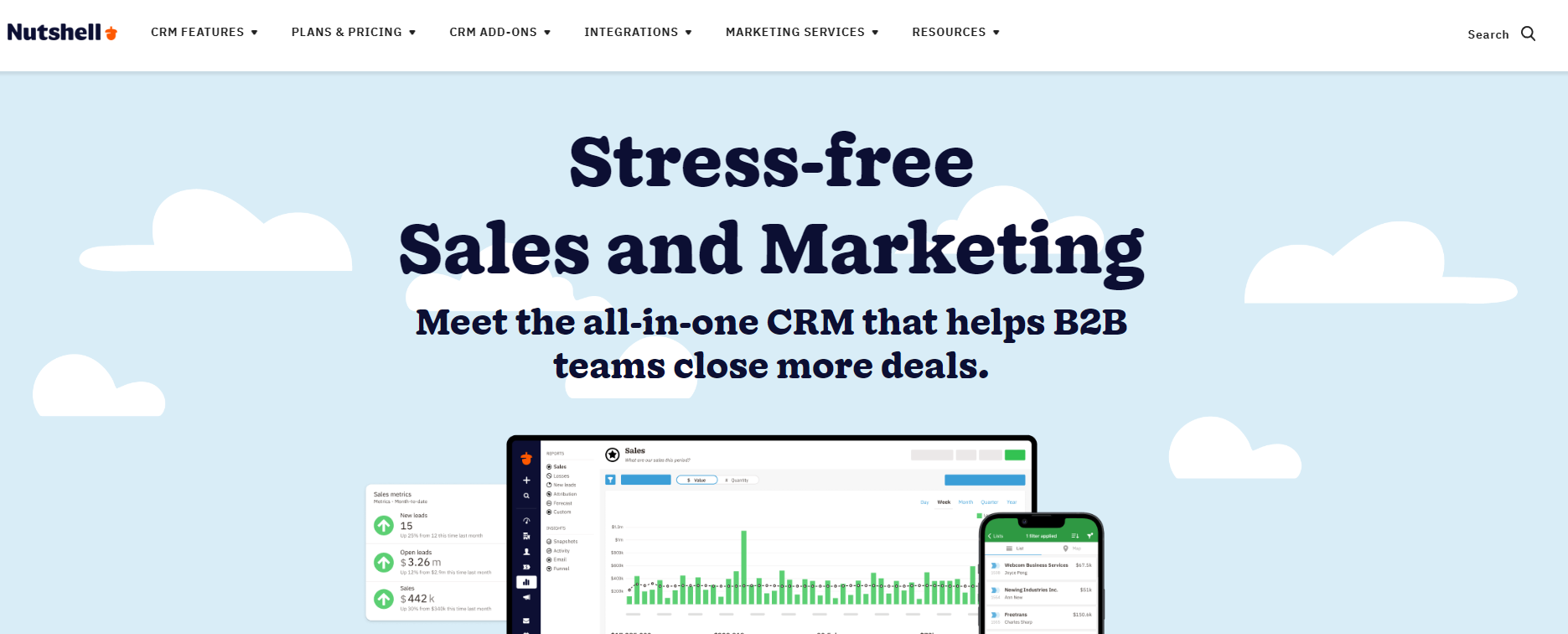
Nutshell is a CRM platform designed for B2B teams.
Since 2009, this versatile tool has supported over 5,000 companies across 50 countries.
It’s safe to say it’s not a tool that’s been built up in a hurry.
At its core, Nutshell focuses on next-action sales strategies.
It prioritizes effective sales activities through customizable, activity-based sales processes.
This approach, combined with its AI-powered capabilities, positions Nutshell as a formidable contender in the AI CRM space.
Key Features:
- Contact Management: Quickly access up-to-date information on contacts, allowing you to maintain strong relationships and make informed decisions.
- Pipeline Management: Flexibly track sales with multiple views for managing leads, enabling you to visualize and optimize your sales funnel for maximum efficiency.
- Sales Automation: Automate lead assignments, task reminders, and other repetitive tasks.
- Marketing & Email Automation: Create web forms that seamlessly integrate leads into your pipeline and set up automated email sequences.
- AI-Enhanced Capabilities: Leverage predictive analytics for better decision-making and automate routine tasks.
Pros:
- Offers a balance of core CRM functionalities and advanced AI features, making it suitable for businesses of various sizes
- Provides world-class live support for all customers, ensuring you’re never alone when needed.
- Includes data migration assistance, facilitating a smooth transition from your current CRM system
Cons:
- Some advanced features are only available as paid add-ons, which may increase overall costs
- The learning curve for customizing activity-based sales processes might be steep for some users
- AI features are limited to higher-tier plans, so they might be out of reach for businesses just starting.
The Key Features Of An AI CRM
I mentioned a lot of features above.
Knowing which ones are important for your business is key to choosing the right platform.
Here are the main features to consider.
Natural Language Processing (NLP)
NLP is like giving your CRM a crash course in “human-speak”.
Imagine having a super-smart assistant who understands what your customers are saying and can read between the lines.
That’s NLP!
It’s not just about recognizing words though.
It’s about getting the context, the emotion, and even the intent behind them.
This means your AI CRM can have more natural, meaningful customer conversations.
It will also be able to dig deeper into your data to uncover insights you might have missed.
Predictive Analytics
Predictive analytics is like a CRM’s crystal ball – but way more reliable.
By crunching numbers from your past data, predictive analytics can:
- Forecast trends
- Predict customer behavior and even
- Tell you which leads are most likely to convert.
Imagine how easier it becomes to make smart business decisions when you can predict what’s coming.
Automation
Automation is where things get really exciting.
No matter what you’re doing, your CRM knows it should do specific things at specific times.
Whether 3 AM or 3 PM, your CRM is already hard at work, entering data, qualifying leads, and sending out personalized email campaigns.
It’s like having a tireless assistant who never sleeps and never complains about overtime.
This frees you up to focus on the big-picture stuff that moves the needle for your business.
Integration Capabilities
Your AI CRM shouldn’t (and can’t) be an island.
The right integration capabilities are crucial.
You want your CRM to play nicely with all your other business tools.
For example, it should work well with your marketing automation platform, make it easy to share notes with your email system and integrate well with your customer support software.
These seamless integrations make your business processes work together in perfect harmony.
Common AI CRMs Misconceptions
Before you click off and start using the best AI CRM from the above, consider these misconceptions.
Awareness of these misconceptions means you can address them as soon as they arise.
This can be crucial when you run a team using a CRM, use a specific CRM, or are just getting started with customer relations.
AI CRMs Will Replace Human Sales Teams
There’s this idea that AI CRMs are here to replace sales teams.
This couldn’t be further from the truth!
It’s not about kicking salespeople to the curb; it’s about giving them “superpowers”.
Think of AI CRMs as the high-tech assistant to your sales team’s abilities.
If they’re set up right, they’re not here to steal the spotlight.
Instead, they’re there to make the main character perform better.
AI CRMs Can “Think” Creatively
AI CRMs are absolute wizards at handling the boring, time-consuming stuff that salespeople often dread.
Think of the data entry tasks that feel like they go on forever.
Or the endless task of qualifying leads.
These are never fun tasks.
However, I would say that you shouldn’t rely on AI CRMs to swoop in and take care of anything that requires “business creativity” or even business-critical tasks.
Now, you should definitely use all the predive data you can get.
But you should also be responsible for making those key, final decisions.
Conclusion
Choosing the right AI CRM can transform your business strategy.
Imagine an assistant that handles tasks and predicts your next best move.
These CRMs can also handle the grunt work.
Your sales team can focus on building relationships, understanding the nuances of each customer’s needs, and closing deals with that personal touch.
And that touch is one that no machine can replicate.
The right CRM combined with knowing your business is a great recipe for success.
It’s time to pick the platform that suits your business best and run with it!
Further reading on AdamEnfroy.com: If you’re exploring scheduling software, you might find my insights on the best scheduling tools useful.
For those interested in marketing, I’ve also written at length about AI marketing concepts and tools.
To further enhance your marketing strategy, check out top AI marketing tools that can automate your business processes effectively.
Additionally, if email marketing is part of your strategy, my review of the best email marketing services for businesses will provide valuable insights.
